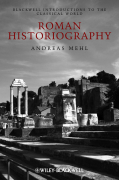
Roman historiography: an introduction to its basic aspects and development
Mehl, Andreas
Mueller, Hans-Friedrich
Roman Historiography: An Introduction to its Basic Aspects and Development presents a comprehensive introduction to the development of Roman historical writings in both Greek and Latin, from the early annalists to Orosius and Procopius of Byzantium. Provides an accessible survey of every historical writer of significance in the Roman world Traces the growth of Christian historiography under the influence of its pagan adversaries Offers valuable insight into current scholarly trends on Roman historiography Includes a user-friendly bibliography, catalog of authors and editions, and index INDICE: Translators Preface. Introduction: The Importance of Ancient Historiography and the Purpose of this Book. Chapter 1: Ancient Literature and Roman Historiography. 1.1 Roman Literature and its Relation to Greek Literature. 1.2 Roman Historiography and the City of Rome. 1.3 The Claims of Artistry and Truth in Ancient, especially Roman, Historiography. 1.3.1 Literary Artistry andMoral Preoccupations in Ancient Historiography. 1.3.2 'History is what Actually Happened' -- Ancient Historiography and the Modern Science of History. Chapter 2: The Formation and Establishment of Tradition in the Ruling Class of theEarly and Middle Roman Republic. 2.1 Family Histories and Clan Traditions. 2.2 The Annales Maximi and the Almanacs of Publius Mucius Scaevola. Chapter 3: Early Roman Historiography: Self-Justification and Memory in earlier AnnalisticWriting. 3.1 Early Annalistic Writing (I). 3.1.1 Quintus Fabius Pictor. 3.1.2Later Authors (From Cincius Alimentus to Postumius Albinus). 3.2 Early Annalistic Writing (II). 3.2.1 Marcus Porcius Cato. 3.2.2 Other Authors (from Cassius Hemina to Sempronius Asellio). 3.3 Early Historical Epic in Rome (Naevius and Ennius). Chapter 4: The Historiography of Rome between the Fronts of the Civil Wars. 4.1 Later Annalistic Writing: Optimates vs. Populares and TraditionalAnnalistic Writing vs. Contemporary History. 4.2 Autobiographies, Memoirs, Hypomnemata, Commentarii, and their Influence on the Historiography of Current Events. 4.2.1 Self-Representations until Cicero. 4.2.2 Caesar's Commentarii. 4.3 The History of Current Events to Order and Contemporary Concepts of Historiography (Cicero). 4.4 Biography (Cornelius Nepos). 4.5 The Experience of the Collapsing and Ruined Republic. 4.5.1 Gaius Sallustius Crispus. 4.5.2 Gaius Asinius Pollio. 4.6 Antiquarian Writings. Chapter 5: Augustan Rome, Roman Empire, and other Peoples and Kingdoms. 5.1 Titus Livius: Roman History from Romulus to Augustus in its Entirety. 5.2 World History, the History of the World beyondRome, and Roman History by Non-Romans and New Romans. 5.2.1 World History andRoman History (from Diodorus to Juba). 5.2.2 Dionysius of Halicarnassus: Early Rome and the Greeks. 5.2.3 Pompeius Trogus: World History round about Rome. 5.2.4 Universal Chronology (Castor and Dionysius). Chapter 6: Imperial Historyand the History of Emperors -- Imperial History as the History of Emperors. 6.1 Empire and 'Republic': Senatorial Historiography. 6.1.1 Gaius (?) Velleius Paterculus. 6.1.2 Authors of the Julio-Claudian and Flavian Period (from Cremutius Cordus to Pliny the Younger). 6.1.3 Publius (?) Cornelius Tacitus. 6.1.4 Lucius Cl(audius) Cassius Dio Cocceianus. 6.2 Rome and Foreign Peoples. 6.2.1 Josephus. Flavius Josephus: Jews and Others. 6.2.2 Appian of Alexandria: A Retrospective View of the Establishment of Rome's World Domination. 6.3 Imperial History as Imperial Biography.
- ISBN: 978-1-4051-2183-5
- Editorial: Wiley-Blackwell
- Encuadernacion: Cartoné
- Páginas: 304
- Fecha Publicación: 15/04/2011
- Nº Volúmenes: 1
- Idioma: Inglés
